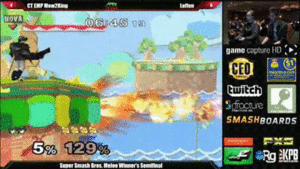Edge hopping: Difference between revisions
mNo edit summary |
m (→Overview) |
||
| (11 intermediate revisions by 8 users not shown) | |||
| Line 1: | Line 1: | ||
{{ArticleIcons| | {{ArticleIcons|allgames=y}} | ||
[[File:Fox ledgedash.gif|thumb|300px|{{Sm|Leffen}} performing a perfect ledgedash to escape edge [[pressure]] and reset the game to neutral position.]] | [[File:Fox ledgedash.gif|thumb|300px|{{Sm|Leffen}} ({{SSBM|Fox}}) performing a perfect [[ledgedash]] to escape edge [[pressure]] and reset the game to neutral position while battling {{Sm|Mew2King}} ({{SSBM|Marth}}).]] | ||
'''Edge hopping''' is a technique | '''Edge hopping''' is a technique prevalent through the entire ''Super Smash Bros.'' series that is used to return to the [[stage]] from an [[edge]]. | ||
Edge hopping is the | ==Overview== | ||
Edge hopping is very simple in concept. It entails dropping from the ledge (by pressing either "back" or "down" on the [[control stick]]) and immediately [[double jump]]ing. The player now has many options when in this state, providing many layers of [[mindgames]]. Players can use their aerial drift to return to the stage, or they follow the double-jump with an [[air dodge]] or aerial attack; they can even grab the ledge again, using their [[intangibility]] frames to [[ledgestall]] depending on the game, or, in ''Melee'', [[waveland]] on-stage, which is known as a [[ledgedash]]. The player can also follow the midair jump by a [[wall jump]] on certain stages, depending on level geometry and the height of the character's wall jump, in order to surprise the opponent. | |||
Edge hopping is the most flexible way to return to the stage- players may perform almost any aerial attack or special attack that can be done in the air, or air dodge in any direction, directly after edge hopping. However, if the opponent can read the edge hopper and interrupt them during the process, they can be hit off-stage without a second jump, a very unsafe position that is basically a [[self-destruct]] for some characters. It should be noted that characters experience fewer [[intangibility]] frames when edge hopping than when rolling or jumping from the ledge. | |||
''[[Super Smash Bros. Brawl]]'' removed the directional air dodge, removing edge hopping options with it, making recovering more predictable as a result. In ''[[Super Smash Bros. 4]]'', its usefulness depends on air time and damage of a character affect how much intangibility is earned by grabbing the edge. Edge hopping is now a significantly more risky option; if the player regrabs the ledge without landing on the stage, they will receive no invincibility at all after several consecutive regrabs. The introduction of ledge stealing, however, allows players to knock an opponent off the ledge through their ledge intangibility and set up edgeguarding attacks. ''[[Super Smash Bros. Ultimate]]'' retained these changes, but also reinstated the directional air dodge, reintroducing that layer of edge hopping. Players will also not be able to grab the ledge at all after 6 regrabs, nerfing edgehopping in that way, but attempts to edgeguard by putting a player in hitstun will refresh that regrab limit, buffing edgehopping in that way. | |||
==See also== | ==See also== | ||
*[[Edge-guarding]] | *[[Edge-guarding]] | ||
*[[ | *[[Jump]] | ||
[[Category:Techniques (SSB)]] | [[Category:Techniques (SSB)]] | ||
[[Category:Techniques (SSBM)]] | [[Category:Techniques (SSBM)]] | ||
[[Category:Techniques (SSBB)]] | [[Category:Techniques (SSBB)]] | ||
[[Category:Techniques (SSB4)]] | |||
[[Category:Techniques (SSBU)]] | |||
Latest revision as of 14:15, January 18, 2024
Edge hopping is a technique prevalent through the entire Super Smash Bros. series that is used to return to the stage from an edge.
Overview[edit]
Edge hopping is very simple in concept. It entails dropping from the ledge (by pressing either "back" or "down" on the control stick) and immediately double jumping. The player now has many options when in this state, providing many layers of mindgames. Players can use their aerial drift to return to the stage, or they follow the double-jump with an air dodge or aerial attack; they can even grab the ledge again, using their intangibility frames to ledgestall depending on the game, or, in Melee, waveland on-stage, which is known as a ledgedash. The player can also follow the midair jump by a wall jump on certain stages, depending on level geometry and the height of the character's wall jump, in order to surprise the opponent.
Edge hopping is the most flexible way to return to the stage- players may perform almost any aerial attack or special attack that can be done in the air, or air dodge in any direction, directly after edge hopping. However, if the opponent can read the edge hopper and interrupt them during the process, they can be hit off-stage without a second jump, a very unsafe position that is basically a self-destruct for some characters. It should be noted that characters experience fewer intangibility frames when edge hopping than when rolling or jumping from the ledge.
Super Smash Bros. Brawl removed the directional air dodge, removing edge hopping options with it, making recovering more predictable as a result. In Super Smash Bros. 4, its usefulness depends on air time and damage of a character affect how much intangibility is earned by grabbing the edge. Edge hopping is now a significantly more risky option; if the player regrabs the ledge without landing on the stage, they will receive no invincibility at all after several consecutive regrabs. The introduction of ledge stealing, however, allows players to knock an opponent off the ledge through their ledge intangibility and set up edgeguarding attacks. Super Smash Bros. Ultimate retained these changes, but also reinstated the directional air dodge, reintroducing that layer of edge hopping. Players will also not be able to grab the ledge at all after 6 regrabs, nerfing edgehopping in that way, but attempts to edgeguard by putting a player in hitstun will refresh that regrab limit, buffing edgehopping in that way.
